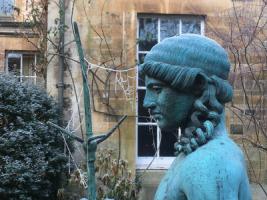
When reading through the articles which make up The Oxford Polyglot, term after term, I am struck by the directions it allows me to take without leaving my desk, by the variety of experiences and the wealth of opportunities recounted by students and alumni. This issue is no exception as it includes reflections on Oxford past and present as well as inviting us to consider ways in which languages open doors.
A love for languages partly shaped Dame Mariot Leslie’s remarkable career which took her to Singapore, Paris, Rome and Bonn as well as Oslo where she was British Ambassador before being Her Majesty’s Ambassador and Permanent Representative to NATO. It has never left her and, now retired, she looks forward to her weekly French conversation classes in Edinburgh. Lizzie Peck’s infectious joy in speaking and hearing foreign languages, engaging with friends from different horizons at home and abroad, but also in recognising how the skills honed during her degree are put to use in everyday and exceptional work contexts, delighted all those who heard her talk at the Sir Robert Taylor conference early this autumn. By popular demand we have included a shortened version of her speech. Organised by Nicola Brown, our Schools Liaison and Outreach officer, with other members of our administrative and support teams, the conference offered an occasion for secondary school language teachers to meet each other and members of the Faculty. This is only one of many events Nicola organises for UK secondary schools to help support pupils and teachers studying languages in what everyone will agree is often a difficult context.
You will recall that our Trinity issue included a photograph of Jacqueline Mitchell, who went on to become an interpreter at the United Nations in New York https://www.mod-langs.ox.ac.uk/oxford-polyglot/2023-24/trinity-term-2024/newcastle-united-nations, alongside Dr John Dunn, a future senior lecturer at the University of Glasgow, where he taught Russian and Polish. We have since identified a third person: Bill Wells, who read French and Russian and also pursued a language-related career. He is currently Emeritus Professor in Human Communication Sciences at the University of Sheffield. Jackie, John, Bill and the fourth, as yet unidentified student, were pictured on the steps of the Taylorian. The Taylor Institution is still the hub of many of our activities. Two of our current doctoral students recount recent events held there and in which they took part. Kate Sligo was one of the organisers of a very successful graduate conference on Instability and Destabilisation which included doctoral researchers from near and far as well as our very own Dorothée Boulanger as keynote speaker—Dorothée will be evoking the recent visit of Dr Gibson Ncube of Stellenbosch University with whom she has been collaborating in the next edition of The Oxford Polyglot. Sofia Kosourova, who is researching Ukrainian and Russian film about the conflict, recounts the recent visit to Oxford by Natalka Vorozhbyt, a prominent Ukrainian playwright, screenwriter and director who had much to share with her audience. The current conflict means our students do not go to Russia but spend time in other countries where they can practise their language. Atticus Evans-Lombe had an eventful year abroad which included putting his Russian to good use on a drive from Kazakhstan to Paris (or nearly). His account reads like an adventure film and we are all amazed by how much he managed to pack in to the trip. Whilst Atticus was having to react orally on the spur of the moment, alumna Sheela Mahadevan, now a lecturer in French and Francophone studies at the University of Liverpool, has used her finely honed translation skills to produce an English version of Ari Gautier's novel Carnet secret de Lakshmi. We took the opportunity to catch up with her and ask her about her time at Oxford, the tradition of Indian Francophone writing and the translation she has just published (Lakshmi's Secret Diary). Who could resist the idea of a heroine who is a Temple elephant? Rather than pachyderms, beetles and other insects were involved in many events around the Kafka centenary. The much-admired exhibition in the Bodleian library which, thanks to the late Sir Malcolm Pasley, Magdalen’s former tutor in German, owns most of Kafka’s manuscripts, was one of the features of a bumper year as Barry Murnane recounts. We hope that you managed to attend the star-studded reading of The Metamorphosis in the Sheldonian or to enjoy The Hunger Artist in the Old Fire Station or one of the many concerts and visits which took place across Oxford.
Let me end by celebrating some recent achievements: Professor Patrick McGuinness’ poetry collection, Blood Feather, has been shortlisted for the Inaugural PEN Heaney Prize, and Karen Leeder’s translation, Shining Sheep by ALTA. Our student Manuela Crivelli received the 2024 Valentina Guevara Prize for the best essay on an Argentinian topic by a graduate at a UK university. Professor Andrew Kahn’s project to digitise letters of Catherine the Great (CATCOR), run in collaboration with Oxford graduate Dr Kelsey Rubin-Detlev, has been awarded an NEH grant.
As we get into the mood for Oxmas, with the nights drawing in, lights, trees and carol singers abound around the city. I wish you all the best for the festive season, wherever you spend it, and hope we will have occasions, in the Faculty, to welcome you or engage with you actively in 2025.

Professor Jonathan Thacker
Chair of the Faculty of Medieval and Modern Languages